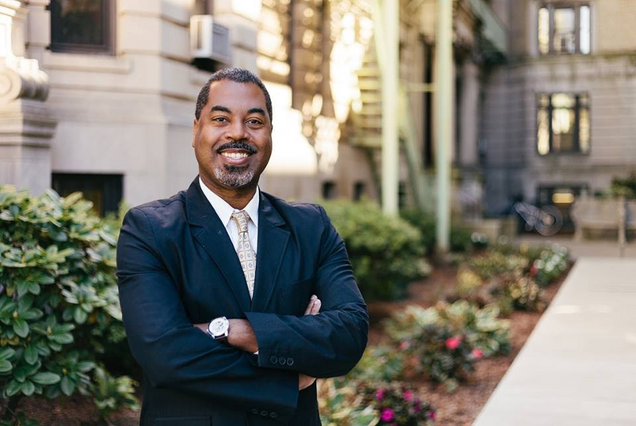Faculty Friday: Phillipe Copeland
Faculty Friday is a series highlighting members of the Initiative on Cities (IOC) Faculty Advisory Board, by exploring their work on campus and in the city. This week, we are highlighting Phillipe Copeland, Clinical Assistant Professor at the School of Social Work.
By Claudia Chiappa
Claudia Chiappa: Tell me a little bit about yourself and your work inside and outside of Boston University.

Phillipe Copeland: I’m a Clinical Assistant Professor at the BU School of Social Work. My teaching, scholarship and service focus on the intersection of social justice, democracy and social welfare with an emphasis on racial justice. My areas of interest include decarceration, the Black Lives Matter movement, antiracism education, health justice, and Abolition.
What projects are you currently working on?
I’m currently working as a Co-Lead for the Promote Smart Decarceration Grand Challenge, one of thirteen Grand Challenges that serve as the flagship program of the American Academy of Social Work & Social Welfare. We currently have several workgroups addressing areas such as reentry, behavioral health, policing, antiracism, Abolition, and the Social Work profession. I have also developed a framework for understanding health justice as an Abolitionist issue, drawing on the work of Cedric Robinson, W.E.B Du Bois and Angela Davis, among others. I’ve been using this framework as a basis for creating learning experiences for health, public health, and human services professionals. In addition, I’m a scholar-activist for the Movement for Black Lives and have been doing work in several areas, including #DefundThePolice, #8toAbolition, electoral justice, reparations, and economic justice.
Your focus areas span from racial justice to mass incarceration and mental health. How are these issues connected?
It’s all connected. All of these problems are mechanisms or outcomes of racial capitalism, the use of racism for economic and social gain. Mass incarceration, for example, can be seen as a form of class warfare, with racism as its weapon of mass destruction. It deepens the racist class gap while preying on those least protected from it and most affected by it. Mental health is one of many casualties of this process. Mental health can’t just happen in the head. It has to happen in the world as well. A world where mass incarceration is the norm, is not conducive to healthy minds.
How do we achieve a world without racism? What is the role of cities in achieving this goal?
To achieve a world without racism requires a few things. First, we need people with both the will and the skill necessary to solve the problem. Our entire educational system needs to be marshalled to ensure highly skilled antiracism practitioners. This is as critical as improving education and training in the S.T.E.M and health care areas. These highly skilled antiracism practitioners will have to work collectively to address all the dimensions of racism: structural, cultural, ideological, moral and psychological. This will be a multigenerational struggle but is achievable. There is nothing inevitable about racism. People created this problem. People can solve this problem. As arenas of struggle where racism is acutely experienced on multiple levels, cities can serve as laboratories of liberation. They are in a great position to learn and to lead.
The COVID-19 pandemic has hurt cities all over the world and heavily exacerbated many pre–existing issues. What do you think is the best course of action for cities to recover and prevent current inequalities from further worsening in a post-pandemic world?
One way is to grasp more fully how racial capitalism is itself a “pre-existing” condition and THE social determinant of health. Closing the racist class gap is public health practice. We will need bold, redistributive policies as well as policies targeted at those least protected and most affected by the dual pandemics of COVID-19 and systemic racism. At the very least, this requires ensuring basic needs are met such as food, housing, health, education, wages, safety, and life-sustaining environments from neighborhoods to the planet itself. If the post-pandemic world looks like returning to a “normal” that was not working for many people, we will have failed.
How can students become more engaged with their cities and play a part when battling racial, social, and economic issues?
The most important part of being a student is learning. They should make sure that they don’t leave their educational institutions without gaining the will and skill necessary to effectively battle racial, social, and economic injustice. They should seize every opportunity to do so and where those opportunities are lacking, they should demand them. Such opportunities should include service learning, where they get practical experience in arenas of struggle beyond the classroom and off campus.
What project would you like to work on in the future?
I’d be really interested in creating more learning opportunities for people in the health, public health and human services to develop an Abolitionist approach to health justice.